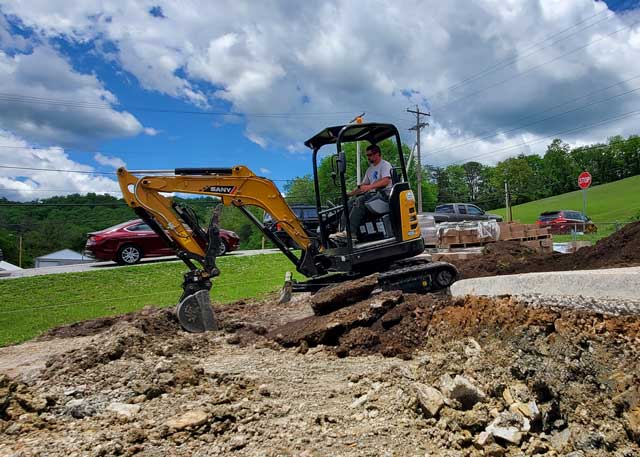Dump Truck Companies in Ohio - Reliable Dump Truck Solutions Throughout Ohio
Dump Truck Companies in Ohio - Reliable Dump Truck Solutions Throughout Ohio
Blog Article
Comprehensive Excavation Approaches: Understanding the Basics for Success
In the world of construction and civil design, the value of reliable excavation approaches can not be overemphasized. The careful planning, exact execution, and meticulous focus to information needed in excavation projects require a thorough approach that includes numerous basic facets. From initial soil evaluation to the application of precaution and routine progress tracking, mastering these core components is important for attaining success in any excavation endeavor. The real proficiency exists not just in recognizing these fundamentals but in effortlessly incorporating them to browse the complexities of excavation projects with skill.
Recognizing Excavation Task Preparation

Successful excavation projects are improved the foundation of precise and complete preparation. The preliminary phase of any kind of excavation task is the preparation stage, where important choices are made that can significantly impact the outcome of the project. During this stage, it is important to collect all pertinent details concerning the website, including topographical surveys, dirt structure, and any type of prospective risks that may exist. Comprehending the job timeline, scope, and spending plan restrictions is critical for developing a comprehensive excavation plan that ensures the task's success.
One key facet of excavation job preparation is the development of an in-depth timeline that describes the sequence of tasks, turning points, and deadlines. This timeline acts as a roadmap for the project group, allowing them to track progression and make needed adjustments to make sure the project remains on schedule. Additionally, a well-defined spending plan that accounts for all expenses, including tools leasing, labor costs, and products, is vital for staying clear of cost overruns and hold-ups. By carefully thinking about all these variables throughout the drawing board, excavation projects can be carried out successfully and properly, resulting in successful results.
Dirt Evaluation and Site Evaluation
Conducting complete dirt analysis and site evaluation is an essential action in the prep work phase of any kind of excavation task. Dirt evaluation entails determining the composition, framework, and homes of the soil at the excavation website. This information is essential for recognizing the dirt's bearing capacity, dampness content, and capacity for erosion, which are key consider determining the excavation approaches and equipment required for the project.
Site evaluation surpasses soil evaluation and encompasses a more comprehensive analysis of the overall site problems. This assessment includes determining any possible threats, such as underground utilities, environmental problems, or unpredictable surface, that might impact the excavation procedure. By extensively assessing the website, project managers can establish reliable excavation methods that focus on security, efficiency, and ecological defense.
Using innovative technologies like ground-penetrating radar, soil sampling, and drone surveys can improve the accuracy and effectiveness of soil evaluation and site analysis. Spending time and sources in these preliminary actions can eventually save time and avoid pricey hold-ups or issues during the excavation procedure.
Devices Choice and Utilization
Efficient excavation projects rely heavily on critical devices option and utilization to guarantee optimum performance and performance. Choosing the best equipment for the job is essential in optimizing efficiency and decreasing downtime. Variables such as the sort of soil, depth of excavation, and project range play a considerable role in establishing the most suitable devices for the job handy.

In addition to choosing the suitable tools, proper use is key to job success. Operators must be trained to handle the equipment safely and successfully - lancaster excavation. Regular maintenance checks and timely repair work help stop malfunctions and ensure consistent efficiency throughout the task
Precaution and Regulations Conformity
In the world of excavation jobs, focusing on safety and security procedures and conformity with regulations is extremely important to making sure a safe and secure and lawfully audio operational environment. Safety and security steps encompass a variety of methods, including performing thorough site assessments, applying appropriate signage and barriers, and providing appropriate safety and security training for all employees included in the excavation procedure. Adherence to regulations, such as OSHA requirements in the USA, makes sure that the excavation project fulfills the essential standards to shield employees, onlookers, and the surrounding atmosphere.

Surveillance Progression and Adjusting Methods
How can predict managers effectively track the improvement of excavation projects and adjust their techniques accordingly to maximize results? Surveillance progress is necessary for making certain that excavation tasks remain on track and satisfy deadlines. Job supervisors can Find Out More use various tools and methods to track progression, such as day-to-day progression records, regular website inspections, and progressed surveillance technologies like drones and general practitioners tracking systems. By continually monitoring the project's improvement, managers can identify any kind of possible hold-ups or problems early and take positive procedures to resolve them.

Verdict
In conclusion, mastering the basics of thorough excavation strategies is important for the success of any type of project. By understanding project preparation, evaluating dirt and website conditions, picking appropriate tools, abiding by safety and security laws, and checking progression, task managers can make certain a efficient and smooth excavation procedure. Applying these methods will result in effective end results and reduce possible dangers or problems throughout the excavation job.
The preliminary phase of any excavation job is the planning stage, where essential decisions are made that can considerably influence the outcome of the task. Understanding the project spending plan, extent, and timeline constraints is crucial for creating a detailed excavation plan that makes sure the project's success.
Exactly how can forecast discover this managers efficiently track the improvement of excavation tasks and adapt their techniques as necessary to maximize end results? By carefully keeping track of progress and being ready to adapt approaches, job managers can enhance the overall success of excavation projects.
By comprehending job planning, analyzing dirt my website and site problems, choosing ideal devices, conforming with safety and security guidelines, and checking progression, task managers can make certain a smooth and efficient excavation procedure.
Report this page